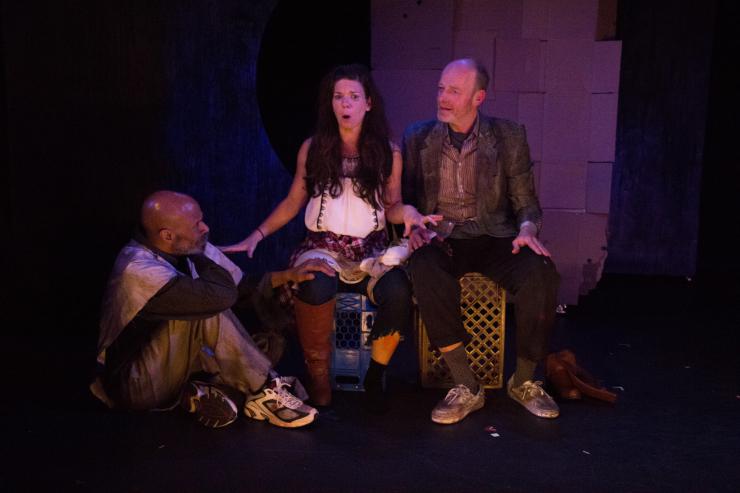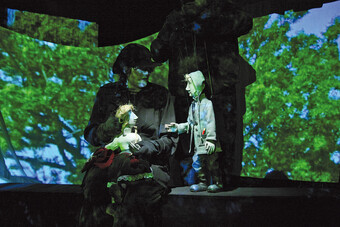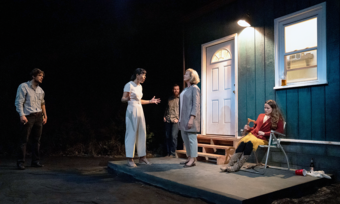Dietrich Bonhoeffer
The Cost of Discipleship
This series explores the ideas of three mystical thinkers, and looks at how their philosophies can be applicable to theatrical work.
Dietrich Bonhoeffer (d. 1945) was a German Lutheran pastor, theologian, and anti-Nazi dissident. After returning to Germany from the United States on the last scheduled steamer to cross the Atlantic, he joined the anti-Hitler underground and was arrested in April 1943. He was executed by hanging on April 9, 1945.
Bonhoeffer argued that individuals should not retreat from the world but act within it. His struggle offers a parallel to and guidance for how we should act, as American politics take a difficult and dark turn.
One of his more beautiful and timely ideas was his conception of “costly grace,” in The Cost of Discipleship:
We are fighting today for costly grace. The sacraments, the forgiveness of sin, and the consolations of religion are thrown away at cut prices. Grace without price! Grace without cost . . . the world finds a cheap covering for its sins.
While the idea of any sort of spiritual “grace” might seem antithetical to the wry, “realistic” worldview so often proposed in contemporary theatrical productions, it nonetheless resonates deeply with the world around us. A quick perusal of the morning news highlights how many elected leaders, sports figures, social mentors, and religious officials are indeed claiming the easy “grace” of words, while not working for the more difficult goal of genuine contrition and redemption.

Social leader after social leader behaves in a spiritually and often socially negative manner, says a few words of prayer, and accepts “grace” at no cost.
So, how can the idea of “costly grace” based in deeply felt contrition, self-awareness, and painful personal change affect a theatrical production? Often, theatre pieces look for a “button”—a strong finish defined by a character’s redemption or realization, or simple closure at the end the play. In this case, the audience leaves the theatre with a sigh and a smile, experiencing the easy grace of having been entertained, but not challenged to question or ponder.These plays demand costly grace through implicating the audience at the end of the play.
One manner of implementing a costlier grace would be to make the idea of closure come at a much higher price. That is to say, have an ending which implicates the audience in the creative process, forcing them to think out beyond the end of the play. For instance, the Broadway production Hand to God ended with just such a moment, the last line being: “The thing about a savior is you never know where to look. Might just be the place you saw the devil before.” Each individual in the audience is left to ponder where they look for the “devil,” where a “savior,” and how much distance they put between the two in their own lives.
Numerous other plays opt for the more difficult “costly grace” over the easy “button” of evil downfallen or love ascendant. Steven Karam’s The Humans leaves us with a question mark, as it follows the disintegration (and not reintegration) of a family; and even a historical play such as Skin of Our Teeth (Thornton Wilder, most recently seen at Theater for a New Audience in 2017) ends where it began, with Sabina addressing the audience and turning over the responsibility of continuing the action, or life, to them.
These plays demand costly grace through implicating the audience at the end of the play. Another manner is to thematically counterbalance a “costly grace” against “easy grace,” by showing two characters or situations which evince both ideas. One of the great mysteries of life is why bad things happen to good people, and vice versa.
This would be a beautiful, confusing, and thought provoking dynamic—setting up someone who utilizes “easy” grace to get ahead, against another person who yearns for “costly” grace, only to find spiritual victory and social and perhaps emotional defeat.
This plot twist might affect many aspects of a production. For instance, a costume designer might dress the anti-hero in beautiful or light colored clothing, while the protagonist—in terms of holding out for costly grace—might be in ill-fitting, dark, or frayed garb. A lighting designer might use lighter yellow and rose hues for “easy” character, while darker or more ominous lighting might indicate our genuine protagonist. And language might be reversed, as well, with the more spiritually yearning character using a degraded, or perhaps even vile language, while the one going for easy grace might be articulate, mellifluous, and convincing.
These confusing elements would not only highlight the difference between the social acceptability of an “easy” grace, but would add an element of “cost” for the audience, as they attempted to unpack all of the confusion and figure out how they reacted to the obvious messaging, and to the underlying, hidden themes.
Another beautiful statement from The Cost of Discipleship might influence the creation of a theatre piece: “The disciples are strangers in the world, unwelcome guests, and disturbers of the peace. No wonder the world rejects them!”
This is a challenging sentiment, which immediately separates a protagonist from the other characters in a play, and perhaps from the world presented. It’s not easy, as it is important in a production that the characters have a kernel of something sympathetic, so the audience remains engaged with their struggles. But when the main character is by necessity a “stranger in the world,” a risk of presenting a black and white tableau emerges.
But what true artist retreats from such a challenge? The idea of setting off a character against the rest of the personages, as well as (perhaps) the central belief system of the play offers fodder for much conflict, thought-provoking dialogue, and action. For instance, in my play Sub-Basement, the wise men were homeless, while the “respectable” figures held important jobs in law enforcement, yet weren’t able to help the main character find her true purpose.

Other devices than character flipping might be utilized. Different soundscapes underscoring the idea of being in the “right,” yet unacknowledged; lighting which highlights the difference between characters in the majority, and the one alone representing morality, or costume choices nodding at this distinction could help drive the designers’ ideas. You can see in the photo above that the repositories of knowledge were dressed in tatters.
Additionally, dialogue might be tweaked, with the “moral” character having a different speech pattern—accent, tone of voice, tempo, or vocabulary—perhaps more grounded than the other figures, offering an anchor in a world of airy, heightened language. This would denote they were “grounded” in a spiritual reality, while generally-accepted social norms were simply poetry, signifying nothing more than a person’s cleverness, not wisdom or intelligence.
Through studying the ideas of Dietrich Bonhoeffer, learning a bit about his courage and, at times, contradictions in his life and thought, many specific ideas for a theatrical production might emerge which can offer novel, thought-provoking, and spiritually nourishing impetus for writing, designing, and producing a play.
Suggested reading:
Dietrich Bonhoeffer, The Cost of Discipleship
Dietrich Bonhoeffer, Letters and Papers from Prison
Dietrich Bonhoeffer, Act and Being













Comments
The article is just the start of the conversation—we want to know what you think about this subject, too! HowlRound is a space for knowledge-sharing, and we welcome spirited, thoughtful, and on-topic dialogue. Find our full comments policy here
Thanks, Cole -- his work is powerful and thoughtful.
Tom
Thanks for this post. I'd suggest Guirgis' Last Days of Judas Iscariot as a play which effectively portrays costly grace - grace which can only be received at the humbling cost of our own acceptance of forgiveness.